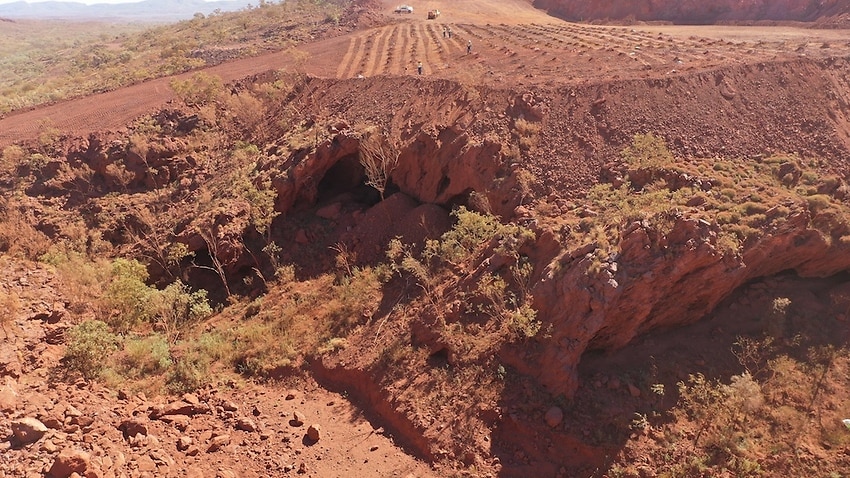Federal MPs have slammed Rio Tinto’s “inexcusable” destruction of the sacred Juukan Gorge caves and recommended the mining giant compensate the Traditional Owners, the Puutu Kunti Kurrama and Pinikura (PKKP) people.
The Northern Australia Committee on Wednesday tabled its interim report into the blast, having heard months of evidence from key players and Indigenous groups.
“Never again can we allow the destruction, the devastation and the vandalism of cultural sites as has occurred with the Juukan Gorge – never again!” the forward of the report states.
“Rio Tinto’s role in this tragedy is inexcusable,” the report says.
“Rio knew the value of what they were destroying but blew it up anyway. It pursued the option of destroying the shelters despite having options which would have preserved them.”
The interim report made a total of seven broad recommendations, including calling on Rio Tinto to properly fund the Aboriginal Cultural Material Committee and “investigate the large number of heritage sites de-registered since 2011”.
The report recommended the company “commit to a permanent moratorium on mining in the Juukan Gorge area, negotiated with the PKKP, and that this is respected by all mining and exploration companies”.
It also advised an “independent review of all its agreements with traditional owners to ensure they reflect best practice standards”.
The mining giant blew up the 46,000-year-old rock shelters in Western Australia’s Pilbara region in May to extract $188 million worth of high-grade iron ore.
The company’s chief executive Jean-Sebastien Jacques, corporate relations chief Simone Niven and iron ore boss Chris Salisbury all resigned in September amid widespread outrage and significant investor pressure following the Juukan incident.
Rio had approval under WA’s outdated Aboriginal Heritage Act but has since apologised and conceded the blast should not have happened.
Committee members met with PKKP representatives last month and visited the Juukan sites to assess the damage first-hand.
“The grief of the Traditional Owners was almost overwhelming for everyone who witnessed it,” the report says.
“They had lost more than a piece of heritage – they had lost part of themselves, a piece of their living culture which was infused with the still present spirits of their ancestors and pregnant with the future stories of their descendants.”
WA’s new draft Aboriginal heritage laws, viewed as insufficient by Indigenous groups and heritage experts, won’t go before parliament until after the March election.
The report recommends WA’s government refrain from considering any new Section 18 applications before the new laws pass, “unless it can be … verified that there is current free, prior and informed consent obtained from traditional owners”.
Aboriginal Affairs Minister Ben Wyatt has repeatedly ruled out such a move.
The report also recommends federal MPs urgently review the adequacy of the Aboriginal and Torres Strait Islander Heritage Protection Act 1984.
Such a move will be opposed by the mining industry, which has called for heritage protection to be left to the states.
The inquiry, which will deliver a final report next year, has also placed scrutiny on other big miners.
It was revealed Andrew Forrest’s Fortescue Metals Group withheld $1.9 million in royalties to a Pilbara indigenous group after traditional owners declined to sign land access deeds.
Other Aboriginal groups said they had been rushed into signing complex land use deals that left them with little ability to protect sites.
Rio, which is reviewing participation agreements struck with Pilbara traditional owners, has said it is determined to prevent a repeat of the incident and pledged not to enforce any potential gag orders against Indigenous groups.
It has agreed to a moratorium on mining in the Juukan Gorge area until at least January 2021.







